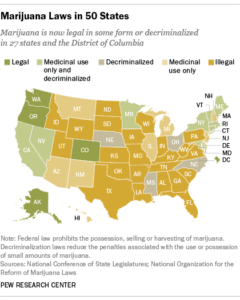Marijuana is becoming legal in more states, including in California. But this is causing an issue on the road. Although studies on the subject are still underway, reports that have already been conducted show that those under the influence of marijuana are less likely to be involved in a fatal car accident than those under the influence of alcohol.
The Effects Of Marijuana When Driving
 Although many marijuana users feel more in control than those under the influence of alcohol, the effects of marijuana can impact your ability to drive. Being under the influence of marijuana could cause the following issues:
Although many marijuana users feel more in control than those under the influence of alcohol, the effects of marijuana can impact your ability to drive. Being under the influence of marijuana could cause the following issues:
- Decreased concentration
- Slowed reaction time
- Impaired judgment
- Lessened coordination
All of the above factors increase the risk of getting into a traffic accident or being observed driving impaired by a police officer. But one question has been left unanswered: How much is too much?
The Legal Conundrum
As of 2014, only six states had set legal limits for the amount of THC in the bloodstream when operating a vehicle.1 Colorado and Washington both set the limit at five nanograms of THC per milliliter of blood. In states without a legal limit, any THC found in the urine or blood can result in a DUI. It can take a week to get back test results, regardless of the testing method used.
This creates a legal conundrum, especially in states where recreational or medical marijuana use is legal. Without a legal behind-the-wheel limit, how can law enforcement officials assess whether a driver is intoxicated?
This makes it more difficult to prove a DUI case, unless other factors, such as reckless driving, are present.
Why Set Limits?
At first, it may seem that the best policy is to tolerate no THC in the system. In states with legalized marijuana use, this can pose a major problem. THC can remain detectible in a urine test for a week or longer, and it remains in the blood stream for up to 24 hours. Just because a driver tests positive for THC, doesn’t mean they are currently under the influence – unless THC levels are high.
Setting a limit allows for the residual THC that remains in the blood and urine, while still providing a means to assess the driver’s ability to operate a car safely.
Consequences of DUI and Marijuana
 In states where marijuana is fully legalized, like Washington and Colorado, preliminary DUI numbers are up. Officers are still learning how best to determine whether a driver is impaired, with blood testing and THC limits being the first step in this process. In most states, you have the right to refuse a blood test, and in the words of DWI Attorney Zev Goldstein, Esq., “you should utilize your constitutional rights by pleading the fifth. It’s the job of the law enforcement to find evidence against you.”
In states where marijuana is fully legalized, like Washington and Colorado, preliminary DUI numbers are up. Officers are still learning how best to determine whether a driver is impaired, with blood testing and THC limits being the first step in this process. In most states, you have the right to refuse a blood test, and in the words of DWI Attorney Zev Goldstein, Esq., “you should utilize your constitutional rights by pleading the fifth. It’s the job of the law enforcement to find evidence against you.”
However, this doesn’t mean you’ll be clear from any wrongdoing. If you are arrested for DUI in California, your consent to a blood or breath test is implied, so testing will be required. It is best to call a criminal defense attorney with experience handling DUI drug cases so that you can protect your freedom.
At Wallin & Klarich, our DUI attorneys have over 30 years of experience successfully handling DUI cases in California. Call our offices today at (888) 280-6839 for a free phone consultation. We will get through this together.
1. [http://www.huffingtonpost.com/2013/12/31/marijuana-dui_n_4520129.html]↩



